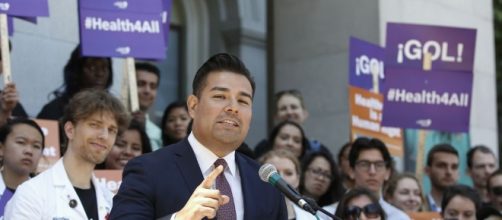A government-run health care initiative passed the California State Senate last Thursday. The measure passed with a 23-14 vote.
The bill now passes onto the California State Assembly for revision and then heads back to the Senate for approval. If it passes there, it will go on to be signed by Governor Jerry Brown and put into action, effectively replacing Obamacare in the Golden State.
The Healthy California Act, also known as Bill 562, was introduced by State Senator Ricardo Lara, a Democrat from Bell Gardens, alongside Senator Toni Atkins. It began by being passed by the California Senate Appropriations Committee last Wednesday in a 5-2 vote.
What's covered
“With President Trump’s promise to abandon the affordable care act as we know it," Lara said, adding that it would leave many of Americans without coverage.
However, Senate Bill 562 goes further than Obamacare, allowing all 40 million residents of California cost-free access to primary care physicians, specialists, and even acupuncturists and chiropractors. Co-pays and deductibles would be eliminated.
All residents of the state would be covered, regardless of their level of income or immigration status.
Financial concerns
Though the bill passed with a strong majority in the State Senate, the bill comes with no proposal for covering its $400 billion price tag, a figure which was released after a cost assessment in May, and which represents almost the total of the state's yearly budget.
However, The California Nurses Association called on the University of Massachusetts Amherst to reassess the cost, and a study released by the University estimated a more conservative figure of $331 billion.
The nurses said the state could count on $225 billion from current health care funding from both the state and federal governments, as well as various tax subsidies. The Amherst study proposes that lawmakers add two new taxes to pay the tab: a 2.3% tax on revenue above $2 million for businesses, and a 2.3% general sales tax.
The study also found that another $75 billion could be made by allowing the state to negotiate better drug prices with pharmaceutical companies.
A Senate staff analysis also found that the discrepancy could be made up with a 15% tax increase on the top 15.3% of earners.
Despite the numerous proposals for covering the cost of the program, it remains uncertain whether Governor Brown, a fiscal conservative, will sign on.
Too optimistic?
Despite the fact that a strong majority of Americans support single-payer health care, criticism of the initiative comes from both sides of the aisle.
Republican Senator Ted Gaines of El Dorado Hills said of the measure, “I can’t think of a more effective way to cripple the state financially.”
Democratic Senator from San Diego Ben Hueso implied that the Senate was reckless in its move to pass the bill, asking why the bill didn't come with a financial plan.
However, the bill's co-sponsor Senator Toni Atkins defended her proposal adamantly: “I took this on because it is a right that I believe people should have. I’m more convinced of that today than I ever have been.”


